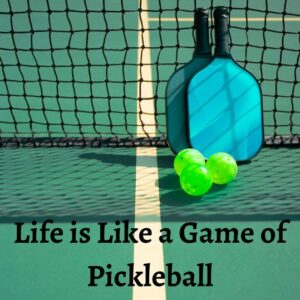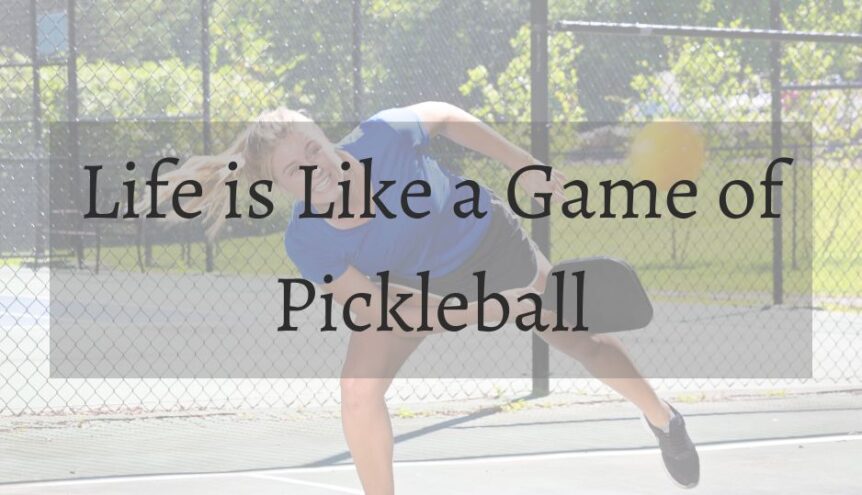 Pickleball. Have you heard of it? Maybe you’ve even played it. About six years ago, friends invited us to dinner—and a rousing game of pickleball. I somehow assumed the game was a new form of ping pong, and since it was during the heat of summer, I wore my cute sandals. It wasn’t until they both looked at my feet with raised brows and asked if I brought other shoes that I realized my mistake.
Pickleball. Have you heard of it? Maybe you’ve even played it. About six years ago, friends invited us to dinner—and a rousing game of pickleball. I somehow assumed the game was a new form of ping pong, and since it was during the heat of summer, I wore my cute sandals. It wasn’t until they both looked at my feet with raised brows and asked if I brought other shoes that I realized my mistake.
I’ve since learned that pickleball was invented in 1965—that’s right, almost sixty years ago—by two dads looking for something fun to offer their bored children. How I’d never heard of it before is a mystery. All I can say is I don’t get out much. These friends were such avid fans of the game, they had their own fenced-in pickleball court installed on their property, with lights for night play and everything. I thought only rich people could afford such luxuries—which they weren’t. That’s dedication! And while we enjoyed the game (although my feet took a beating), we hadn’t played since.
And then a few weeks ago, a church friend texted me and asked if I wanted to join a group of people that started playing at our local recreation center. I thought it would be fun, while giving me the chance to make new friends. I wasn’t kidding about not getting out much. What I didn’t expect was that I’d get hooked—and in turn get Chris hooked. We even bought our own paddles to help improve our game.
If you’re unfamiliar with pickleball, it’s a cross between tennis, badminton, and ping pong (only because the paddles are not much larger than ping pong paddles.) A sturdy pair of athletic shoes are suggested. Since Chris played tennis throughout high school and for years later, he’s a natural. Me, not so much. But it’s still a lot of fun—and educational.
“Educational?” you might be asking. How so? I’m so glad you asked!
I started thinking about the rules of pickleball and how they are analogous with life lessons. First off, the court is divided into sections, with the first seven feet on either side called The Kitchen. One pickleball website says, “Unless you’re drinking, stay out of the kitchen.” It’s off limits unless we have to enter in order to return the ball—then we get right back out again.
We tend to push our noses into other people’s business when it’s not our place. Giving unsolicited advice, gossiping about what others are doing, and even hovering over our adult children. The kitchen is a small area, and it gets mighty crowded in there with too many cooks, and according to the old saying, this tends to spoil the soup. We need to know when to let go of control and trust that the Lord has it. We also need to mind our own beeswax, as my mom used to say.
A good way to ease into pickleball, and learn how to control our volleys, is by dinking. Yeah, I thought it was a weird word, too. Dinking can be a form of practice, but it can also be a game. This is where our volleys must stay in the kitchen. It requires a very controlled, soft return. No crazy stunts or smashing the ball. I could easily dink all day, because I get nervous about messing up when I know a hard volley is coming my way in a traditional game.
But just as in life, if we play it safe all the time, we won’t grow. If we stick to our comfort zone, life will get very dull very quickly. There are few challenges and fewer wins when confined to a very small field in which to work. Play big or go home.
Here’s an analogy that’s true for not only pickleball, but tennis, baseball, and golf—keep our eye on the ball. When we’re distracted with the future, it’s hard to do well in the present. Our aim is off, and more often than not, we flub it up. Focus on what’s right in front of us, do the best we can, and trust the outcome.
Another analogy that’s probably universal across team sports is to cover for our teammates—or in this case, our partner. When that ball (or a life-challenge) is over our heads or out of our reach, we need to be able to depend on our partner to jump in and help us out. Yes, if the ball lands in our side of the court, we’re responsible for it. But pickleball partners, just like our spouses, should be ready to support us—and we have to appreciate them when they do, even if their return doesn’t quite hit the mark.
In the end, it’s not whether we win or lose, but how we play the game. We need to follow the rules, be kind and supportive, encouraging and joyful. We will get hit with lots of wild balls, and sometimes our returns won’t go well. But we need to do the best we can and be grateful that our mistakes are covered by the blood of Jesus—and then we’re spiritual winners either way.
An athlete is not crowned unless he competes according to the rules—2 Timothy 2:5 (ESV)







Comments 2
I remember when my granddaughter was telling me that she played pickle ball. I had never heard of it. She had trouble telling me what it was. Thank you, Jennifer for this lesson on pickle ball and life.
Author
You are welcome!